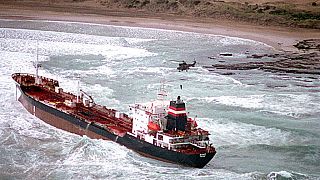Mauritius
The captain and first mate of the MW Wakashio, a ship whose grounding in 2020 caused an oil spill on the coast of Mauritius, were found guilty Tuesday of the worst pollution ever known in this Indian Ocean archipelago.
The Japanese bulk carrier ran aground on July 25, 2020 on a coral reef southeast of Mauritius, releasing more than 1,000 tons of fuel oil into its crystal clear waters.
The Indian captain, Sunil Kumar Nandeshwar, who admitted during the hearing that he had been drinking during a party organized on board the ship, was found guilty, along with his Sri Lankan first mate Hitihanillage Subhoda Janendra Tilakaratna, of "endangering the safety of navigation" by a court in Port Louis.
Their sentence will be known on December 27.
The MW Wakashio was en route from Singapore to Brazil, with 3,800 tons of fuel oil and 200 tons of diesel on board, which quickly began to leak but most of which could be pumped out.
"A birthday party had been held on board and I had consumed alcohol in moderation," said during his trial the captain, adding that he had given instructions to approach Mauritian waters in order to pick up the telephone network, so that the crew members could contact their families.
"The sea was bad but the visibility was clear and it was safe to navigate (...) At one point, the ship could not move and had touched the seabed," he added.
"As I had had a few drinks, it didn't seem worthwhile to intervene and it didn't occur to me that we were sailing that close."
Both men apologized for the accident.
The oil spill was the worst marine pollution in the history of the country, which depends on its waters for food security and ecotourism, in an area that has some of the most beautiful coral reefs in the world.
The southeast coast of Mauritius has two classified sites: Blue Bay, known for its corals, and Esny Point, rich in mangroves, crucial ecosystems in the face of global warming.
From the very first days, the inhabitants mobilized, working tirelessly with makeshift means to stem the pollution.
In the months that followed, thousands of people demonstrated on the island, criticizing the government's management of the oil spill.











02:38
Natural harmony of Uganda's 'Ghost Island' under threat from international tourism
02:05
In Zimbabwe, metal scrap collecting is reducing environmental pollution
01:52
Sean "Diddy" Combs will remain in jail until sentencing, bail denied
01:16
Sean 'Diddy' Combs found guilty on two counts, escapes prison for life
02:22
Cameroonian marine conservationists trained as scientific divers
01:12
Judge dismisses juror in Sean 'Diddy' Combs trial